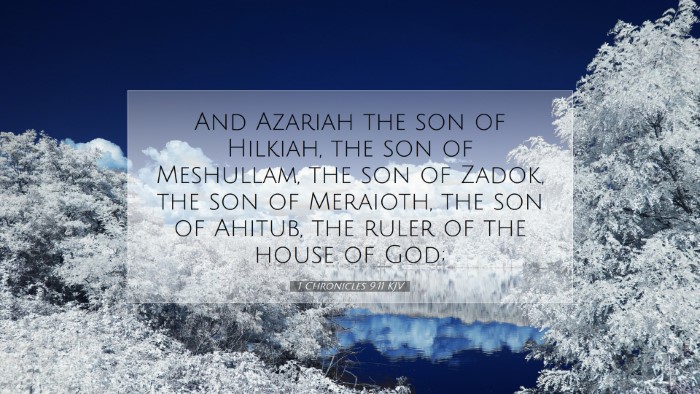Commentary on 1 Chronicles 9:11
1 Chronicles 9:11: "And Azariah the son of Hilkiah, the son of Meshullam, the son of Zadok, the son of Ahitub, the ruler of the house of God."
Overview
This verse is a part of the genealogical records found in the book of 1 Chronicles, which are paramount to understanding the Levitical priesthood and its order. The lineage of Azariah is significant as it emphasizes the priestly heritage connecting back to Zadok, who served during King David's reign.
Historical Context
The record preserved in Chronicles seeks to establish the legitimacy and authority of the priesthood, especially post-exile. The chronicler aimed to remind the returning exiles of their heritage and the sanctity of their roles. Azariah, a descendant of high priestly lineage, symbolizes continuity and faithfulness in God’s covenant with His people.
Commentary Insights
1. Matthew Henry's Insights
Matthew Henry highlights the importance of the priestly lineage, indicating that Azariah represents not only the fulfillment of promises made to the Levites but also the responsibilities that come with such a calling. He notes that the specificity of genealogies serves to affirm God’s sovereignty and faithfulness throughout generations.
2. Albert Barnes' Commentary
Albert Barnes observes that these records serve a dual purpose: they reassure the people of their identity and their connection to God’s promises. The name "Azariah" itself means "Yahweh has helped," signifying that the very role of the priest was supported by divine assistance. Barnes emphasizes that understanding these connections enhances spiritual stewardship among the clergy.
3. Adam Clarke's Reflections
Adam Clarke notes the significance of the priestly office. He mentions that the descendants of Zadok were held in high esteem, and Azariah’s position underscores the Levites' ongoing importance in worship and governance. Clarke stresses the need for spiritual leaders to remain faithful to their divine calling, as exemplified by the lineage of Azariah.
Theological Implications
The text emphasizes the continuity of God’s covenant and the importance of the priesthood in the life of Israel. Here are key theological implications drawn from the commentary:
- Covenant Continuity: The preservation of genealogies underscores God’s unwavering promise to maintain a priestly line.
- Identity and Heritage: For the returning exiles, knowledge of their priestly lineage gave them a renewed sense of identity and purpose.
- Divine Assistance: The priesthood is viewed as a role sustained by God’s help, challenging leaders to rely on divine guidance in ministry.
Practical Applications for Ministers and Scholars
The insights gleaned from 1 Chronicles 9:11 are particularly relevant for contemporary ministry and scholarly work:
- Understanding Authority: Leaders should recognize their authority originates from their connection to God's calling, much like the priests of old.
- Importance of Heritage: Ministers should reclaim and teach the rich heritage of faith, helping congregations understand their identity in Christ.
- Relying on God: Just as Azariah's lineage signifies divine support, current leaders must depend on God's wisdom and strength in their roles.
Conclusion
In summary, 1 Chronicles 9:11 not only serves as a historical record but also as a profound reminder of the enduring nature of God's promises and the vital role of the priesthood. By engaging deeply with the text and its implications through the lenses of recognized commentators, we are encouraged to uphold the values of faithfulness, identity, and divine reliance in our ministries today.


